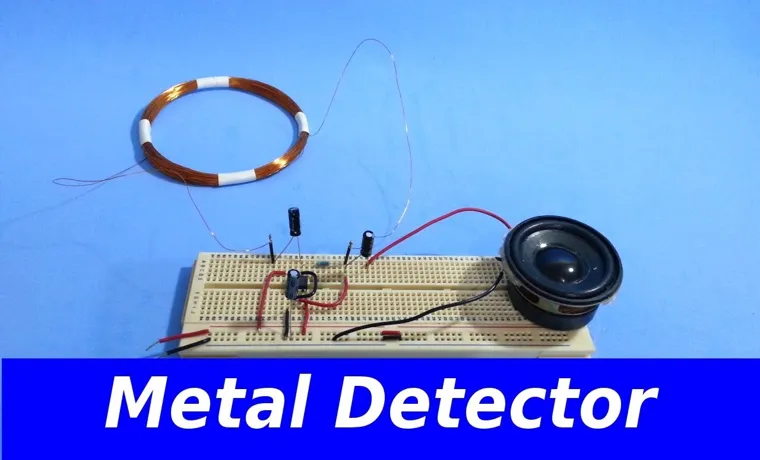How to Get Metal Past a Metal Detector: Effective Methods Revealed
Are you worried about how to get metal past a metal detector? Whether you’re trying to sneak in an item that isn’t allowed, or you simply forgot to remove your belt before going through security, getting past a metal detector without setting it off can be a nerve-racking challenge. But fear not, because there are a few strategies you can employ to increase your chances of success. In this blog post, we’ll explore some techniques and tricks that can help you get metal past a metal detector undetected.
So, let’s dive in and discover some clever ways to outsmart those security systems!
🌱 Stay Connected with Our Gardening Community! 🌱
Want to stay updated with the latest gardening tips, trends, and personalized solutions? Subscribe to our newsletter at BackyardLord.com! Our team of experts and fellow gardening enthusiasts will keep you informed and inspired on your gardening journey.
Why Subscribe to Our Newsletter?
- 🌿 Get customized gardening solutions delivered straight to your inbox.
- 🌿 Connect with like-minded individuals passionate about gardening.
- 🌿 Share your knowledge and learn from others' experiences.
- 🌿 Stay updated on the latest gardening trends, tools, and techniques.
Don't miss out on valuable gardening insights and updates! Subscribe to our newsletter today and let's grow together.
Understanding Metal Detectors
If you’re wondering how to get metal past a metal detector, you’re not alone! Many people have tried to outsmart these machines for various reasons, but it’s important to note that it’s not a foolproof plan. Metal detectors work by detecting the presence of metal objects through electromagnetic fields. When you walk through a metal detector, it sends out a magnetic pulse that can detect any metal objects on or within your body.
However, there are a few strategies that some people have tried to get metal past a metal detector. Some have attempted to hide small metal objects in inconspicuous places, like within their shoes or clothing. Others have tried using non-metallic materials to cover the metal objects, such as fabric or plastic.
However, it’s worth noting that these attempts are not guaranteed to work. Metal detectors are designed to be highly sensitive and can often detect even the smallest metal objects. Additionally, attempting to get metal past a metal detector is illegal in many places and can result in serious consequences.
So, if you find yourself needing to pass through a metal detector, it’s best to leave any metal objects behind to avoid any potential issues.
How Metal Detectors Work
metal detectors, understanding metal detectors

Types of Metal Detectors
metal detectors, types of metal detectors, understanding metal detectors
Common Uses of Metal Detectors
metal detectors, common uses of metal detectors, understanding metal detectors, how metal detectors work, practical applications of metal detectors.
Legal and Ethical Considerations
If you ever find yourself needing to get metal past a metal detector, it’s important to keep in mind both legal and ethical considerations. While it may be tempting to try to sneak something through undetected, tampering with a metal detector is illegal and can lead to serious consequences. Instead, it’s best to focus on finding alternative solutions that are legal and ethical.
For example, if you’re trying to bring a piece of jewelry or a small metal object through a metal detector, you can simply remove it and place it in a separate container before passing through. This way, you can avoid any potential issues and comply with the rules and regulations in place. Remember, it’s always better to do the right thing and abide by the law, even if it may be inconvenient at times.
Why Trying to Get Metal Past a Metal Detector is not Recommended
One might think that trying to get metal past a metal detector would be a clever way to bypass security measures. However, attempting to do so is not recommended for several reasons, both legally and ethically. From a legal standpoint, tampering with or attempting to deceive a metal detector is considered a form of fraud or even criminal activity in certain situations.
It can result in fines, penalties, and potentially even imprisonment. Furthermore, trying to get metal past a metal detector can also be seen as a breach of trust and a violation of ethics. Metal detectors are put in place for the safety and security of everyone, so trying to undermine them poses a risk to others and can disrupt the functioning of public spaces.
Therefore, it is best to respect and comply with security measures rather than trying to circumvent them.
Consequences of Attempting to Get Metal Past a Metal Detector
metal detectors, consequences, attempting to get metal past, legal and ethical considerations When it comes to trying to outsmart a metal detector, there can be serious legal and ethical consequences. Metal detectors are put in place for a reason – to ensure the safety and security of the area. By attempting to get metal past a metal detector, you are essentially trying to bypass this security measure and potentially put others at risk.
This is not only illegal and can result in criminal charges, but it is also highly unethical. Think about it – metal detectors are commonly used in places like airports, schools, and government buildings where large groups of people gather. By trying to sneak a weapon or dangerous item through a metal detector, you are endangering the lives of everyone around you.
It is important to remember that the purpose of metal detectors is to keep everyone safe, and trying to get past them is not only breaking the law but also violating basic moral principles. So next time you encounter a metal detector, think twice before attempting to bypass it – the consequences are simply not worth it.
Practical Tips to Avoid Setting off Metal Detectors
If you’re wondering how to get metal past a metal detector, there are a few practical tips you can try. First, consider the type of metal you’re dealing with. Some metals, like aluminum or plastic-coated stainless steel, are less likely to set off metal detectors than dense metals like iron or lead.
Another tip is to strategically place the metal on your body. For example, try tucking it inside your shoe or hiding it in a pocket with other metal objects like keys or coins. This can help to mask the metal and make it less noticeable to the detector.
Additionally, you can try using diversion techniques. For example, wearing layers of clothing or carrying multiple bags can distract the security personnel and draw attention away from the metal you’re trying to conceal. However, it’s important to note that attempting to bypass metal detectors in certain situations, such as at airports or government buildings, is illegal and could have serious consequences.
It’s always best to comply with security measures and avoid any unnecessary risks.
Minimizing Metal Accessories and Clothing
When it comes to traveling, going through security checkpoints at airports can be a hassle. One way to minimize the time spent in line is by avoiding metal accessories and clothing that can set off metal detectors. It’s not uncommon for people to accidentally set off the alarms because of their belt buckles, jewelry, or even the buttons on their clothing.
So, what can you do to prevent this from happening? First, opt for non-metallic accessories and clothing whenever possible. Choose belts with plastic or fabric buckles instead of metal ones, and leave your chunky bangles and statement necklaces at home. Additionally, it’s a good idea to wear slip-on shoes or sneakers without metal shanks in the soles.
By making these small adjustments, you’ll breeze through security without any unexpected beeps or delays.
Choosing the Right Materials
When it comes to choosing materials for everyday objects, it’s important to consider how they might set off metal detectors. Whether you’re going through airport security or entering a government building, you don’t want to hold up the line or attract unnecessary attention. One practical tip is to opt for non-metallic materials whenever possible.
Instead of a metal belt buckle, for example, consider using a fabric or plastic alternative. Another tip is to choose materials that are lightweight and low-density. These materials are less likely to trigger metal detectors because they contain less metal or have a lower concentration of metal atoms.
Finally, keep in mind that some metals are more likely to set off detectors than others. Titanium and aluminum, for instance, are less likely to be detected compared to stainless steel or brass. By considering these tips and choosing the right materials, you can confidently navigate metal detectors without any fuss or hassle.
Understanding Detector Sensitivity
metal detector sensitivity, setting off metal detectors, avoid triggering metal detectors, practical tips
Alternative Methods to Sneak Metal Past a Metal Detector
If you find yourself needing to sneak metal past a metal detector, there are a few alternative methods you can try. One option is to use a non-metallic container or lining, such as a plastic bag or fabric pouch, to hide the metal object. This can help to mask the presence of the metal and potentially avoid detection.
Another method is to strategically conceal the metal object on your person. For example, you could try attaching it to the inside of your clothing or hiding it in a pocket that is less likely to be searched. However, it’s important to note that these methods may not always be effective, as metal detectors are designed to detect the presence of metal.
Additionally, attempting to bypass a metal detector can be illegal and may have serious consequences. It’s always best to abide by the rules and regulations in place to ensure the safety and security of all individuals.
Using Metal Shielding
alternative methods, metal shielding, sneak metal, metal detector
Disguising Metal Objects
disguising metal objects, alternative methods, sneak metal, metal detector
Taking Advantage of Blind Spots
One of the biggest challenges faced by individuals trying to smuggle metal objects past metal detectors is finding a way to exploit their blind spots. Metal detectors are designed to detect the presence of metal objects by emitting electromagnetic waves and measuring the way they bounce back. However, there are certain areas where the waves may not be as effective in detecting metal objects, such as in the corners of the detection area or in crowded environments where the waves may be interfered with by other objects.
This creates an opportunity for clever individuals to find alternative methods to sneak metal past a metal detector. One alternative method is to conceal the metal object in a non-metallic casing. By wrapping the metal object in materials such as plastic, rubber, or even clay, the metal detector may not be able to detect the metal inside.
This is because the waves emitted by the metal detector have a harder time bouncing back from non-metallic materials, making it more difficult for the detector to determine the presence of metal. However, it is important to note that this method may not work for all types of metal detectors, as some are specifically designed to detect objects hidden within non-metallic casings. Another method is to distract the metal detector by creating a diversion.
This can be done by carrying a metal object that is larger or more metallic than the one you are trying to hide. As the metal detector focuses on the larger or more metallic object, it may overlook the smaller or less metallic one. For example, if you are trying to sneak a small metal object past a metal detector, you could carry a large piece of jewelry or a metal belt buckle to divert the detector’s attention.
Additionally, one could strategically position their body to create a blind spot for the metal detector. By angling the metal object away from the detector or placing it in a pocket or bag that is shielded from the detector’s waves, the chances of the metal object being detected are decreased. However, it is important to note that this method requires careful planning and execution, as any movement or adjustment of the metal object may expose it to the metal detector.
In conclusion, finding alternative methods to sneak metal past a metal detector requires a combination of creativity, cunning, and careful execution. By exploiting blind spots, concealing metal objects in non-metallic casings, creating diversions, or strategically positioning the metal object, individuals may find success in their attempts to bypass metal detectors. However, it is important to remember that these methods are not foolproof and that attempting to smuggle metal objects with malicious intent is illegal and can have serious consequences.
Conclusion
In conclusion, getting metal past a metal detector requires a little bit of creativity and a touch of ingenuity. While I can’t endorse or encourage any illegal or unethical activities, I can certainly appreciate the audacity and resourcefulness that might be necessary in certain situations. Just remember, if you find yourself facing a metal detector and need to smuggle something in, think outside the box.
Hide it in plain sight, camouflage it with other objects, or even consider using non-metallic alternatives. And if all else fails, maybe it’s time to invest in a career as a magician – because making metal disappear is truly an art form.”
FAQs
FAQ 1: How do metal detectors work? Answer: Metal detectors work by creating an electromagnetic field that detects changes in the field caused by the presence of metal objects. When a metal object passes through the field, it disrupts the pattern, triggering an alert. FAQ 2: Can metal detectors detect all types of metals? Answer: Metal detectors can detect most types of metals, including ferrous metals (such as iron and steel) and non-ferrous metals (such as aluminum and copper). However, some metals, such as aluminum foil or very thin metals, may not be detected by all metal detectors. FAQ 3: How can I hide metal from a metal detector? Answer: Hiding metal from a metal detector is not recommended, as it can be illegal and potentially dangerous. However, if you wish to pass by undetected, you could try using non-metallic objects or materials, concealing the metal object inside a non-metallic container, or using various countermeasures. FAQ 4: Can metal detectors detect metal implants in the body? Answer: Yes, metal detectors can detect metal implants in the body, such as hip replacements or pacemakers. It is important to inform security personnel if you have any metal implants when passing through a metal detector to avoid any unnecessary inconvenience. FAQ 5: What happens if I set off a metal detector? Answer: If you set off a metal detector, security personnel may ask you to undergo additional screening, such as a hand-held wand or a physical pat-down. It is essential to comply with their instructions to ensure a smooth and safe screening process. FAQ 6: Are there any substances that can fool a metal detector? Answer: While some substances may temporarily interfere with a metal detector’s readings, such as large amounts of water or dense organic materials, metal detectors are specifically designed to differentiate between metals and other substances. It is unlikely that any substance can consistently fool a well-calibrated metal detector. FAQ 7: Can metal detectors detect microscopic metal particles? Answer: Metal detectors are generally not designed to detect microscopic metal particles. Their sensitivity is typically tuned to detect larger metal objects. However, some specialized metal detectors, such as those used in certain industries or laboratories, may be capable of detecting smaller metal particles. FAQ 8: Can metal detectors differentiate between different types of metals? Answer: Some advanced metal detectors can differentiate between various types of metals by analyzing the conductivity, magnetic properties, or frequency response of the detected metal object. However, not all metal detectors have this capability, and the ability to differentiate metals may vary depending on the model and settings. FAQ 9: Can metal items in my pockets set off a metal detector? Answer: Metal items in your pockets, such as keys or coins, can potentially set off a metal detector. It is advisable to empty your pockets before passing through a metal detector to avoid triggering false alarms and to expedite the screening process. FAQ 10: Are metal detectors used only for security purposes? Answer: While metal detectors are commonly used for security purposes, such as in airports or public venues, they also have applications in various industries, including archaeology, mining, and quality control. Metal detectors are versatile tools for detecting hidden or buried metal objects.






